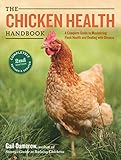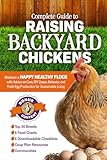This post is all about the benefits of raising chickens.
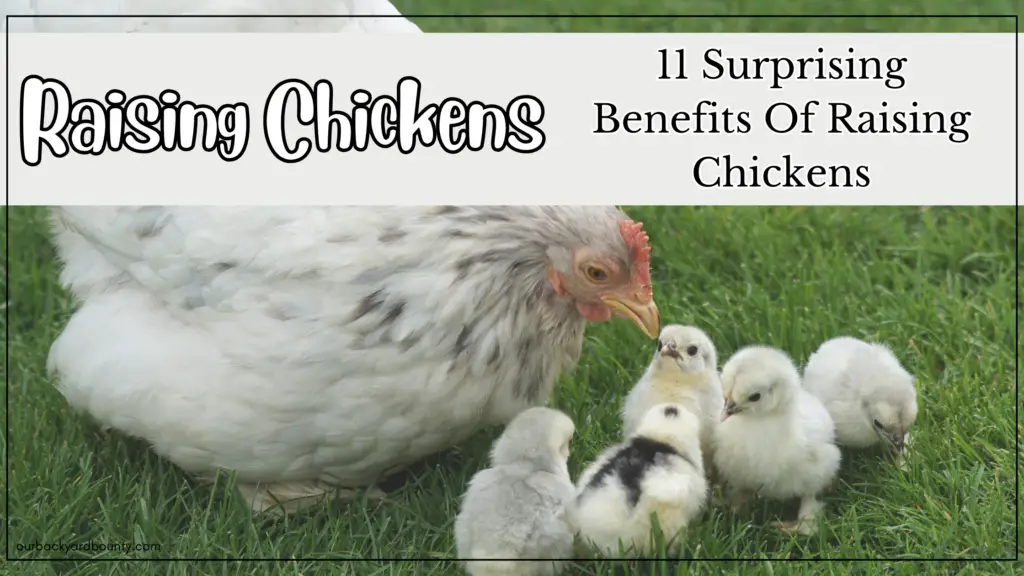
Benefits Of Raising Chickens
Are you thinking about raising baby chickens? Maybe you’ve been thinking about it for years, but are struggling to pull the trigger? If you’ve never owned farm animals, it can feel intimidating, making it difficult to finally take the plunge into chicken keeping. While chicken keeping isn’t for everything, there are numerous benefits of raising chickens that are worth considering.
In this post we will cover the amazing benefits of raising chickens, and hopefully help you get started on your chicken keeping journey. (See Also: 6 Things To Know Before Getting Baby Chicks)
Ok, let’s dive in!
As a means for providing for my family, I may earn commissions if you shop through the links on this page at no additional cost to you. Thank you!
Benefits Of Raising Chickens
1. Know Where Your Food Comes From
Whether you’re raising chickens for eggs, meat, or both, taking ownership of where a portion of your food comes from is an amazing benefit of raising chickens! Unfortunately, the mass egg production industry involves a lot of mistreatment of animals, poor quality control, and unethical processes. Knowing that your eggs and/or chicken come from humanely and responsibly raised chickens is an incredible feeling. In addition to the positive living environment, you also have control over your quality assurance processes. You know that your animals are well-cared for, healthy, and not exposed to disease. You also know that your eggs are collected daily, and properly stored and handled. (When I see those mass recalls on the news, I’m always extra grateful for my feathered friends in the backyard.)
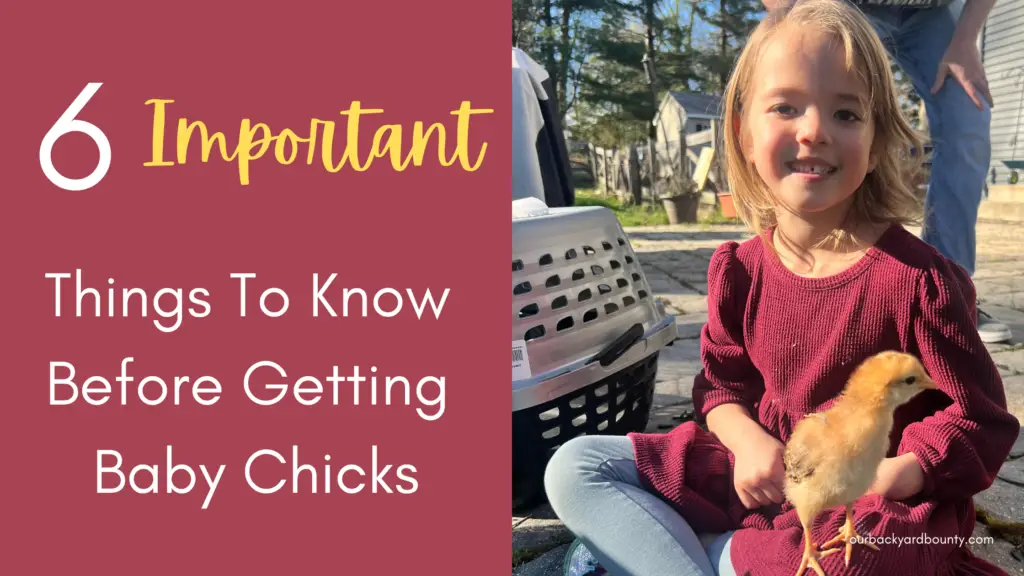
2. Health Benefits
Fresh eggs actually offer higher nutrient value than store bought eggs! So in addition to knowing where your food comes from, you’re actually also getting nutritional benefits.
Fresh eggs often have higher levels of vitamins A, D, E, and some B vitamins, such as B12. Because your chickens will likely have more space to roam, they will have a more varied diet, including insects and plants. This results in eggs that have more omega-3 fatty acids, which are beneficial for brain and heart health. Fresh eggs are also thought to have slightly more choline, which is a nutrient imperative for brain development and liver function.
With your fresh eggs you don’t need to wash them until you’re ready to eat them. Washing the egg strips the natural protective coating (the “bloom”), which helps seal the egg and keep it fresh without refrigerating. Keeping this coating intact until you’re ready to eat it helps retain it’s natural properties.
When raising your own chickens, you have the control to do so without hormones, antibiotics, or industrial feed additives, resulting in a healthier product.
Lastly, eggs lose nutritional value, particularly vitamins and antioxidants, over time. Store-bought eggs are likely weeks or months old by the time they reach the consumer, whereas fresh eggs are typically consumed closer to the date they were laid. (Likely within days, if not same-day.)
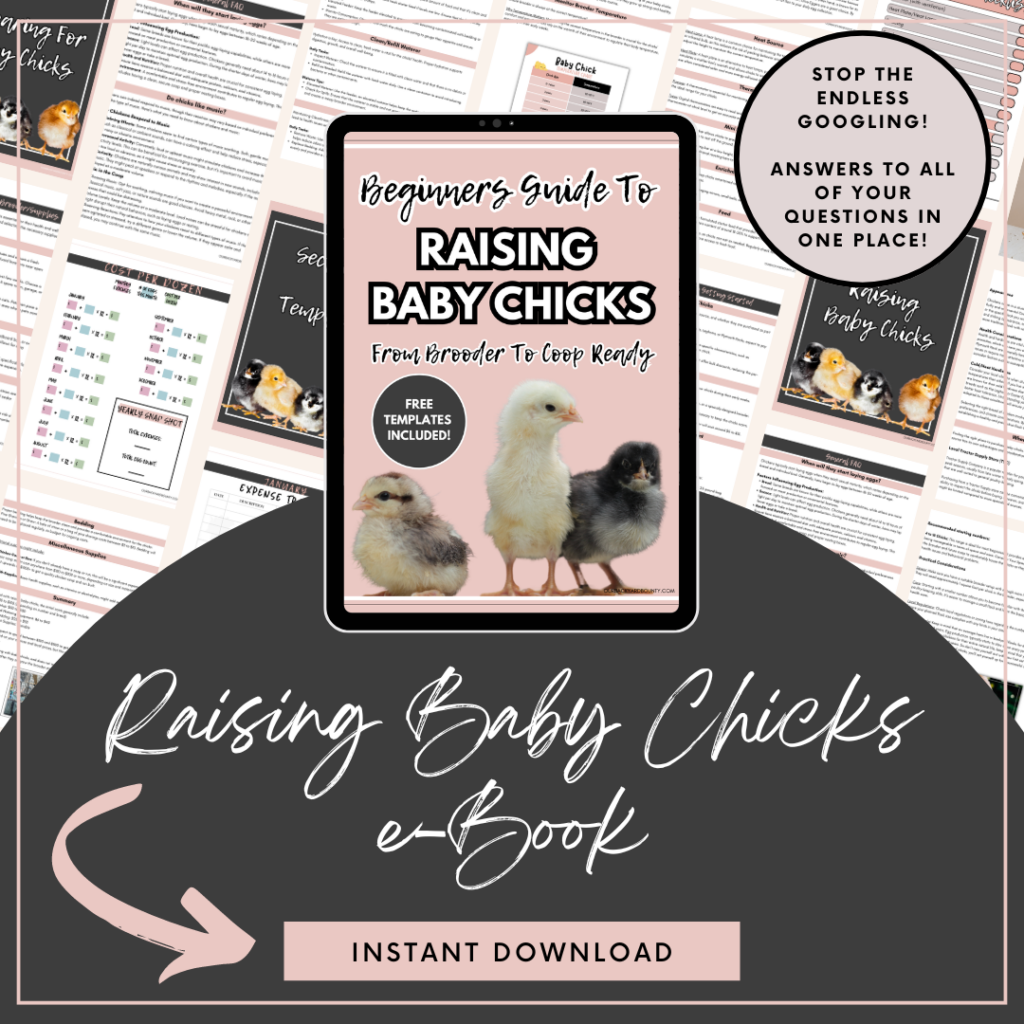
3. Minimize Waste
Chickens are great at helping you minimize waste in the kitchen. A lot of kitchen scraps make healthy treats for chickens. Just be sure to research whether or not it’s safe for chickens before feeding it to them.
So whether it’s end pieces that are left after chopping, or perhaps at the end of the week, you have some left over food that isn’t going to get eaten before it goes bad, give it to the chickens! You’ll notice way less food ending up in the trash when you get chickens. (Note: Never feed chickens moldy food. Feed it to them before it goes bad.)
Safe Kitchen Scraps for Chickens
- Vegetable Scraps
- Leafy greens: Lettuce, kale, spinach, chard.
- Root vegetable tops: Carrot, beet, turnip greens.
- Cooked or raw squash and zucchini.
- Cucumbers (including peels).
- Peas, corn, and green beans.
- Broccoli and cauliflower (stems and florets).
- Fruit Scraps
- Apple pieces (without seeds).
- Berries (strawberries, raspberries, blueberries).
- Melon rinds (watermelon, cantaloupe, honeydew).
- Banana peels and overripe bananas.
- Grapes and citrus in moderation.
- Grains and Bread
- Cooked rice (avoid salty or seasoned).
- Plain pasta.
- Stale bread or whole-grain toast (small quantities, no mold).
- Oatmeal or rolled oats.
- Protein Sources
- Cooked eggs (a great protein boost, but avoid feeding raw eggs to prevent pecking behavior).
- Cooked beans (plain and unsalted, never raw or undercooked beans).
- Meat scraps or trimmings (well-cooked and unseasoned).
- Other Safe Scraps
- Potato peels (cooked).
- Pumpkin (seeds included).
- Herbs like parsley, basil, or oregano.
Scraps to Avoid Feeding Chickens
- Toxic or Dangerous Foods
- Onions and garlic (may taint eggs and cause digestive issues).
- Avocado skins and pits (contain persin, toxic to chickens).
- Raw or undercooked beans (contain hemagglutinin).
- Tomato leaves and green potatoes (contain solanine).
- Harmful Foods
- Moldy or spoiled food.
- Greasy, salty, or heavily seasoned foods.
- Sugary items (candy, chocolate, soda).
- Limited or Restricted Foods
- Citrus fruits (can disrupt calcium absorption if given too often).
- Raw potato peels (except sweet potatoes, which are safe).
- Large amounts of dairy (chickens are not good at digesting lactose).
4. Pest Control
Chickens are great at pest control by eating all of those frustrating bugs around your property during free-range time. Just some of the pests they chow down on include: Beetles, grasshoppers, ants, termites, fleas, crickets, grubs, caterpillars, and fly larvae, including maggots, slugs, snails, and even some smaller rodents or reptiles in certain cases. Chickens will peck at ticks hiding in grass or brush and can help reduce mosquito populations by eating their larvae in stagnant water.
5. Improve Your Yard
Chickens can actually help improve your lawn!
1. Natural Fertilizer
- Rich Manure: Chicken droppings are high in nitrogen, phosphorus, and potassium—essential nutrients for plants. When properly composted, chicken manure becomes a powerful, organic fertilizer.
- Improved Soil Health: Adding composted chicken manure to your garden or yard enhances soil structure, increases its water retention, and boosts nutrient levels.
2. Weed Reduction
- Weed Seed Eaters: Chickens eat weed seeds, helping to prevent unwanted plants from spreading.
- Ground Cleaning: By scratching, they turn up and consume weeds and small unwanted plants.
4. Lawn Aeration
- Scratch-and-Till Action: As chickens scratch and peck the ground in search of food, they loosen and aerate the soil, promoting better root growth for grass and plants.
- Natural Compost Turners: If you have a compost pile, chickens will happily turn it for you as they forage for scraps and bugs.
5. Soil Enrichment
- Breaking Down Organic Matter: Chickens break down leaves, grass clippings, and other organic debris into smaller pieces, which decompose faster and enrich the soil.
6. Pollinator Attraction
- Ecosystem Balance: By reducing pests, chickens create a better environment for beneficial insects like pollinators, which thrive when harmful pest populations are under control.
Things to Keep in Mind
- Protect Sensitive Areas: Chickens can damage flower beds or vegetable gardens if allowed free access. Using barriers or a chicken tractor can help control their movements.
- Compost Manure Safely: Chicken manure should be composted before use to prevent burning plants and to kill pathogens.
- Manage Over-Scratching: While scratching is beneficial, chickens can overwork small areas, so monitor their foraging zones.
6. Get Your Whole Family Involved
Chicken keeping is something that can bring a family together. Caring for the chickens as a family, and nurturing them, as they provide you with nutritious eggs is a great bonding activity for families. If you have kids, raising chickens is a great activity to get them involved in. They will likely enjoy it, especially if you start by getting baby chicks. But in addition to the fun, it’s also incredibly educational for kids to witness first hand where our food comes from, and the care it takes to get that food. (Healthy chickens = healthy eggs!)

7. It’s Fun!
Raising chickens is fun! Especially when starting from baby chicks, it is so fun to watch the chickens grow, and develop their own personalities. You’ll have funny chickens, sweet chickens, adventurous chickens, etc. They each have their own unique personality and they are so fun to interact with. (See Also: Best Chicken Breeds For Beginners) Your chickens will bring you lots of smiles and laughs, which is a huge benefit of raising chickens.

8. How About That Aesthetic!
Just picture this: It’s a beautiful summer morning. Birds chirping. Light breeze. And you’re sitting outside sipping a cup of coffee, just watching your chickens frolic around the yard foraging and chasing bugs. I always feel so blessed, and calm in those moments. Those moments alone make it worth it for me.
9. Rewarding Experience
Chickens are one of the more rewarding pets to have. Not only do you get companionship from the animal, but they provide you with nutritious food. Each morning when you’re cracking those fresh eggs to feed your family, you’re met with a feeling of pride. All the care that you provide your backyard chickens, the nutritional feed you give them, the free range time, keeping the coop clean, etc. All of your efforts resulted in a way for you to feed your family. And it’s healthier and tastier than what you’d get at the store!
10. Tastier Product
In addition to being more nutritious, fresh eggs are also tastier than store bought eggs. This has much to do with the fact that they are FRESH. Store bought eggs are washed/processed, then refrigerated and stored for for potentially 60 days before they make it to your shopping cart.
11. They Can Pay For Themselves
If you’re looking to monetize your flock, in addition to getting fresh eggs, that’s an option as well. There are a few ways you could monetize your backyard flock.
You could sell eggs. A common price for a dozen farm fresh eggs is $5. So if egg production for income is a priority for you, be sure you consider that when selecting chicken breeds. You’ll want to pick high egg producers, and consider looking for breeds that lay deeper into the winter months. (Chickens typically take a break from laying during the winter months.)
Another way you could monetize your flock, if you have a rooster, is to sell fertilized eggs or chicks. Check your local hatcheries and farm stores to see what chicks are selling for. It will vary by breed. This goes for fertilized eggs as well.
Monetizing your flock in this way, would help cover the cost of raising chickens, while still reaping the benefits of fresh eggs for your family.
So, do you think raising chickens is for you?
Top Selling Books On Raising Chickens
- Damerow, Gail (Author)
- English (Publication Language)
- 424 Pages – 12/26/2017 (Publication Date) – Storey Publishing, LLC (Publisher)
- Kuo, Anne (Author)
- English (Publication Language)
- 192 Pages – 06/04/2019 (Publication Date) – Callisto (Publisher)
- Caughey, Melissa (Author)
- English (Publication Language)
- 144 Pages – 11/28/2017 (Publication Date) – Storey Publishing, LLC (Publisher)
- Storey publishing
- Binding: paperback
- Language: english
- Damerow, Gail (Author)
- English (Publication Language)
- Productions, Happy Flock (Author)
- English (Publication Language)
- 133 Pages – 08/27/2025 (Publication Date) – Independently published (Publisher)
- JENKINS, BETTIE (Author)
- English (Publication Language)
- 159 Pages – 07/16/2025 (Publication Date) – Independently published (Publisher)
- Willis, Kimberley (Author)
- English (Publication Language)
- 432 Pages – 12/05/2019 (Publication Date) – For Dummies (Publisher)
- Green, Florian B. (Author)
- English (Publication Language)
- 108 Pages – 09/18/2024 (Publication Date) – Florian B. Green (Publisher)
- Hardcover Book
- Ford, Jessica (Author)
- English (Publication Language)
- 416 Pages – 03/14/2023 (Publication Date) – Abrams Books (Publisher)
- Fewell, Amy K. (Author)
- English (Publication Language)
- 240 Pages – 05/01/2019 (Publication Date) – Lyons Press (Publisher)
15 Thoughtful Gifts For Gardeners To Grab Now
This post is all about gifts for gardeners. Best Gifts For Gardeners If you’re looking…
8 Best Companion Plants For Green Beans For Big Harvests
This post is all about companion plants for green beans. If you’re growing green beans…
The Best Companion Plants for Tomatoes (And What to Avoid)
This post is all about best companion plants for tomatoes. Best Companion Plants For Tomatoes…
10 Herbs To Plant Around Your Chicken Coop – & Why!
This post is all about what herbs to plant around your chicken coop. Best Herbs…
How To Keep Chickens Cool In The Summer Heat – 10 Game Changing Hacks
This post is all about how to keep chickens cool in the summer. Ways To…
10 Best Predator Proof Chicken Coop Essentials
This post is all about predator proof chicken coop essentials. Predator Proof Chicken Coop Essentials…
What You’ll Find Here
Are you eager to embrace the homesteading lifestyle, but worried about not having enough land? Fear not, for you don’t need vast acres to become a mini homesteader. With a little creativity and effort, you can transform your backyard into a thriving homestead, complete with chickens and a garden. Imagine the satisfaction of growing your own food and using it to whip up delicious, healthy meals. And if you’re ready to take the plunge and raise backyard chickens, you’ve come to the right place. This is where we’ll guide you through the world of modern homesteading.

Follow Us On Tik Tok and Instagram!





